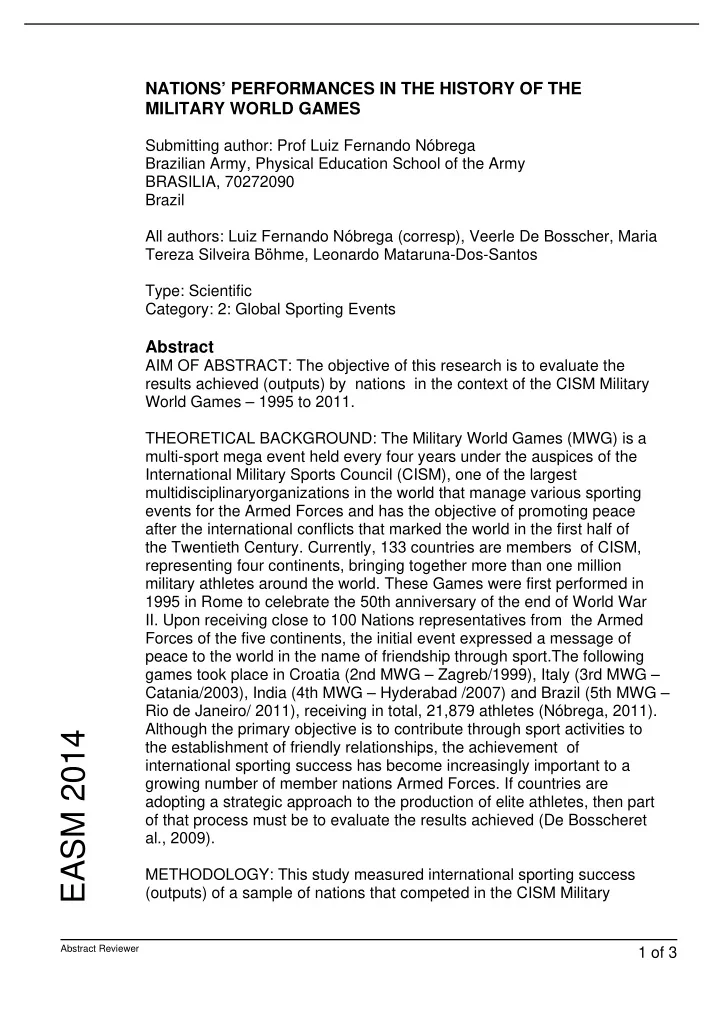

NATIONS’ PERFORMANCES IN THE HISTORY OF THE MILITARY WORLD GAMES Submitting author: Prof Luiz Fernando Nóbrega Brazilian Army, Physical Education School of the Army BRASILIA, 70272090 Brazil All authors: Luiz Fernando Nóbrega (corresp), Veerle De Bosscher, Maria Tereza Silveira Böhme, Leonardo Mataruna-Dos-Santos Type: Scientific Category: 2: Global Sporting Events Abstract AIM OF ABSTRACT: The objective of this research is to evaluate the results achieved (outputs) by nations in the context of the CISM Military World Games – 1995 to 2011.� � THEORETICAL BACKGROUND: The Military World Games (MWG) is a multi-sport mega event held every four years under the auspices of the International Military Sports Council (CISM), one of the largest multidisciplinaryorganizations in the world that manage various sporting events for the Armed Forces and has the objective of promoting peace after the international conflicts that marked the world in the first half of the Twentieth Century. Currently, 133 countries are members of CISM, representing four continents, bringing together more than one million military athletes around the world. These Games were first performed in 1995 in Rome to celebrate the 50th anniversary of the end of World War II. Upon receiving close to 100 Nations representatives from the Armed Forces of the five continents, the initial event expressed a message of peace to the world in the name of friendship through sport.The following games took place in Croatia (2nd MWG – Zagreb/1999), Italy (3rd MWG – Catania/2003), India (4th MWG – Hyderabad /2007) and Brazil (5th MWG – Rio de Janeiro/ 2011), receiving in total, 21,879 athletes (Nóbrega, 2011). Although the primary objective is to contribute through sport activities to EASM 2014 the establishment of friendly relationships, the achievement of international sporting success has become increasingly important to a growing number of member nations Armed Forces. If countries are adopting a strategic approach to the production of elite athletes, then part of that process must be to evaluate the results achieved (De Bosscheret al., 2009).� � METHODOLOGY: This study measured international sporting success (outputs) of a sample of nations that competed in the CISM Military Abstract Reviewer 1 of 3
World Games – 1995 to 2011. This study used methods to gauge outputs proposed by SIRC (2002): absolute success, measured as market share that is a standardized measure of total achievement in an event whereby total medals won are converted into “points” (gold=3, silver=2, bronze=1) and the points won by a given nation are subsequently expressed as a percentage of the total awarded points.The programme of events didn’t change considerably between the editions. Sporting disciplines such as athletics, judo, boxing, football, volleyball, swimming were played in all five games.� � RESULTS, DISCUSSION AND IMPLICATIONS: Russia, despite not having taken part in the Military World Games in Rio de Janeiro, is the most successful nation in the sample with a 25.4%, 19.4%, 24.5%, 21.6% market share of medal pointsin the1st MWG, 2nd MWG, 3rd MWG and 4th MWG respectively. China (8.0%, 11.8%, 15.9%, 17.4%, 16.6%), Italy (10.1%, 8.9%, 14.4%, 5.2%, 7.5%) and Germany (7.1%, 5.0%, ----, 5.5%, 5.5%) are the countries that regularly vied for the second and third place. United States of America (3.6%, 4.2%, 0.8%, 2.0%, 0.9%) has not achieved the same excellent performances that they usually achieve in Olympic competition, with only moderate results in military competitions. It is also observed that Brazil(0.4%, 1.1%, 1.5%, 0.5%, 19.4%), which had been achieving only modest results in previous Games actually placed first in the most recent World Games for which they were hosts. There is some literature that sought to find the factors which determine international sporting success, comparing systems and sport policies of countries. However, few studies approach the role of Armed Forces in the development of high performance sport (Pinheiro, 2011; Digel, 2002). In some countries, elite sport development via the military is a recognized pathway to a career in sport. In Russia, Germany, Italy and France the Armed Forces support elite sport, offering basic conditions for the development of athletes, in order to improve performance in international competitions and to enable them to reach the international level. However, each country has its own policies based on culture, military structure and legislation. In the USA, High school and college sport fills the developmental role that in many other countries like Germany, France and Italy would be the place of civil and military clubs. Eastern European countries originating from the "Iron Curtain" stand out regarding the strong influence of the military EASM 2014 clubs/sports centers.The success achieved by Brazil could be explained by the model of elite sport management adopted, which among several actions, carried out the incorporation of high-performance athletes into the Armed Forces. It can be concluded that projects adopted in countries such as Russia, Italy, China, Germany and Brazil in recent years,are successful, which appear to be confirmed by this study. The findings could be explained by different country's sport systems that influence the sport career pathways of athletes. Abstract Reviewer 2 of 3
References - Nóbrega, Luiz Fernando Medeiros. Analysis of Sport Management Model of High Performance adopted by the Brazilian Army in relation to 5th Military World Games - Rio 2011. Master Thesis - Command and Staff School of the Brazilian Army, Rio de Janeiro, 2011.� - De Bosscher, Veerle; De Knop, Paul; Bottenburg, Maarten van; Shibli, Simon, Bingham, Jerry.Explaining international sporting success: An international comparison of elite sport systems and policies in six countries, Sport Management Review 12 (2009) 113–136� - SIRC (Sport Industry Research Centre).European Sporting Success.A Study of the Development of Medal Winning Elites in Five European Countries.Final Report. Sheffield: SIRC, 2002.� - Digel, Helmut. The context of talent identification and promotion: a comparison of Nations. New Studies in Athletics.Vol. 17, p. 13-26, 2002.� - Pinheiro, José Carlos.The Promotion’s Program of High Performance Sport in the Brazilian Army.Brazilian Olympic Committee, Rio de Janeiro, 2011. EASM 2014 Abstract Reviewer 3 of 3
Recommend
More recommend